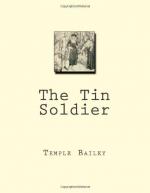Jean, striving to follow Derry’s point of view, found herself floundering.
“I am glad you like it, but I don’t see how you can. And you mustn’t say that you’ve always been a Tin Soldier on a shelf. I won’t have it. And you have played the game of life just as bravely as Tommy Tracy, only your problems were different—. And if you can’t remember wash days you can remember other days—. But I like to have you tell me about it, because I can see you, listening to Tommy and laughing at him. I adore your laugh, Derry, though I shouldn’t be telling you, should I—? I have pasted the picture you sent me of you and Tommy in my memory book and have written under it, ’When you and I were young, Tommy’ and I’ve drawn a cloud of steam above Tommy, with washboilers—and tubs—and cabbages and soap suds, and his mother’s face smiling in the midst of it all—. And in your cloud is your mother smiling, too, with her little crown on her head, and gold spoons for a border—and a frosted cake with candles—and a mountain of ice-cream. Perhaps you have other memories, but I had to do the best I could with my poor little rich boy—”
It was about this time that Jean’s memory book! became chaotic. Most of the things in it had to do with Derry, a bit of pine from a young plume which Derry had sent her from the south—triangles cut from the letter paper on which he sometimes wrote—post-cards to say “Good-morning,” telegrams to say “Good-night”—a service pin with its one sacred star.
There were reminders, too, of the things which were happening across the sea, a cartoon or two, a small reproduction of a terrible Raemaeker print; verse, much of it—
* * * * * *
They have taken your bells, O God,
The bells that hung in your towers,
That cried your grace in a lovely song,
And counted the praying hours!
The little birds flew away!
They will tell the clouds and the wind,
Till the uttermost places know
The sin that the Hun has sinned!
* * * * * *
Jean thought a great deal about the Huns. She always called them that. She hated to think about them, but she had to. She couldn’t pin the pages together, as it were, of her thoughts. And the Huns were worse than the sharks that had frightened her in her little girl days. Oh, they were much worse than sharks, for the shark was only following an instinct when it killed, and the Huns had worked out diabolically their murderous, monstrous plan.
In the days when she had argued with Hilda, she had been told of the power and perfection of Prussian rule. “Everything is at loose ends in America,” had been Hilda’s accusation.




